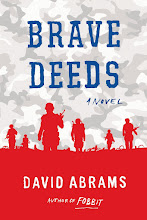 |
| Lt. Dave Johnson: Camp Lucky Strike, France–February 1945 |
As soon as I got home I called a vet center and the man who answered understood. He gave me the name of a woman in Washington State who, like me, had lost her father in WWII. I flew out to meet her and we sat at her kitchen table and talked for a week straight. We put words to things neither of us had ever talked about–our mothers’ silence and who our fathers were and what happened to them. The silence was now broken and the words flew out of us and onto the page. Later, we interviewed others whose fathers had been killed in war and their stories were strikingly similar to ours. We found a publisher willing to work with us, and Lost in the Victory: Reflections of American War Orphans of World War II was published.
When a journalist for the Washingtonian interviewed me about the book, I gave her my personal manuscript about the search for my father. The editor, someone who had also lost his father at a young age, published a chunk of it in the magazine. Reader’s Digest excerpted the story and hundreds of emails filled my box daily; messages from others asking for help to find out where their fathers were buried. Fifty years after the end of the war and the children of the men who died, like me, didn’t know where their fathers were buried. With a touch of my finger on the keyboard I could send them to the right place, but I was staggered to realize the power of words to move into the unknown, open the silence and make connections.
The article that carried the story of my search for my father and his picture traveled the world. My unknown father was now known and seen in Australia, China, France, and India. I was in the airport in Ladakh in the Indian Himalayas when a young woman in a blue sari tapped me on the shoulder and said, “I know your father. I read about him in the Reader’s Digest and I want to be a writer like you.”
Silence exists where pain is unbearable. When I broke the silence surrounding mention of my father, my mother’s pain erupted into rage and I was excluded from the family for several years. Writing about family secrets and ghosts can do that. I found that writing changes the story. It changes those who write it and those who read it and part of my story turned into one of reconciliation. I’ve written about that and about finding my mother’s two sisters who were also lost to silence in a new book, The Beauty of What Remains: Family Lost, Family Found, now out from She Writes Press.
The silence has been replaced by stories, the story of my father and the story of my remarkable aunt who survived over 70 years in a mental hospital with her wits and her humor still intact when I found her alive at age 94, the story of reuniting my shattered family, and the story of finding the words to tell it.
Susan Johnson Hadler, PhD is the co-author, with Ann Bennett Mix, of Lost in the Victory, a book that broke the silence surrounding mention of fathers who died in WWII and how their deaths affected their children. She has published articles in the Washingtonian, Reader’s Digest, and The Mindfulness Bell, and appeared in the Ancestors series on PBS. She formerly lived and taught in Tanzania, East Africa. Hadler worked for over twenty years as a psychotherapist in Washington, DC. Find out more at her website, www.susanhadler.com














No comments:
Post a Comment